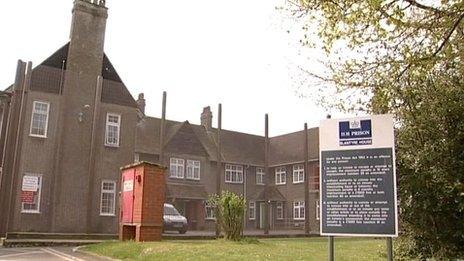Synthetic drug Spice linked to Blantyre House prison violence
- Published

The 120-capacity jail holds inmates who are preparing for release
An increase in violence at a resettlement prison in Kent has been linked to the illicit supply of a synthetic drug.
Blantyre House has seen a rise in violent incidents, including two serious assaults, HM Inspectorate of Prisons (HMIP) said.
Spice, a former so-called "legal high", and associated debt and bullying, was blamed in part for the rise.
The Prison Service said the misuse of drugs is taken very seriously.
The 120-capacity jail, which houses category C and D inmates who are preparing for release, was described as "one of the jewels in the Prison Service crown" in a 2010 inspection.
During an unannounced visit to the prison, near Goudhurst, inmates told inspectors that a gang was involved in the use of the Class B drug, which recreates the effects of cannabis.
It was also reported that they were intimidating more vulnerable inmates and new arrivals.
HMIP added that current testing methods do not detect Spice, so the low positive drug testing rate did not give an accurate picture of the level of narcotic misuse in the prison.
'Disastrous consequences'
Andrew Neilson, director of campaigns at the Howard League for Penal Reform, said: "This is yet another report identifying that a prison which was once excellent is now floundering because of budget cuts.
"It shows the disastrous consequences that happen when the prison estate becomes focused on warehousing people rather than turning lives around."

Spice recreates the effects of cannabis
Chief inspector of prisons Nick Hardwick said Blantyre House still retained many of the strengths identified in the past.
"In particular, its small size means there is an opportunity for its experienced staff to get to know prisoners well and address their needs and behaviour in a personalised way that is simply not possible in larger establishments," he said.
"Those strengths should be advantages in dealing with the wider and more complex range of needs among the prisoners Blantyre House now holds - but neither the prison nor the wider prison service have yet got to grips with the changes required to meet these needs or the resources necessary to make them."
Michael Spurr, chief executive of the National Offender Management Service, which runs offender services in the community and in custody, said: "We recognise that the population at Blantyre House is more complex and challenging than previously and the governor and his team will continue to have the support needed to take forward the recommendations in the report."
A spokesman for the Prison Service added: "We work hard to keep contraband out of prisons and use a range of security measures, including random mandatory drug testing of prisoners and close working with the police and other agencies.
"We will always press for the most serious charges to be laid against anyone attempting to bring drugs and other contraband into prisons, and anyone caught dealing or bullying may be returned to closed conditions."
- Published27 November 2013
- Published23 June 2011